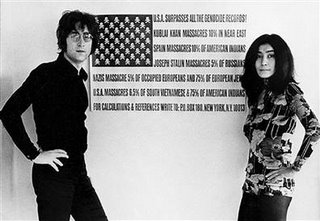The U.S. Vs. John Lennon
Written and directed by David Leaf and John Scheinfeld
Lionsgate
Really, I wondered what the exact purpose of this film was, but considering the time we live in and the parellels to the sixties, I guess it has its place. To be quite terribly honest, I've never grabbed hold of that John Lennon/Beatles bandwagon, but I do know his and their place in rock history and I am a casual fan of their music. I also know that Lennon could be a quite humorous, outspoken figure.
And that's the crux of this documentary, which begins with the late-sixties Beatles and Lennon's infamous withdrawal to future wife Yoko Ono, and what became his New York era. It was the time of Vietnam and unprecedented public outcry, and a number of protest leaders were being investigated by J. Edgar Hoover's limitless FBI operation under the crooked Nixon administration. Lennon and Ono often protested Vietnam in unorthodox ways, the one getting the most attention being the "bed-in" where they vowed to stay in bed for a week in Amsterdam, knowing that whatever he did would be covered in minute detail by the press. Upon his arrival in New York, Lennon befriended many of those aforementioned protest leaders--his incredible fame and popularity with young people drawing concern from the President, with the obvious shady and unlawful attempts to get him deported to follow.
And so, we have a hitlist of those who lived during the times giving their accounts intercut with Lennon/Ono footage--Ono, Walter Cronkite, disabled Vietnam vet Ron Kovic, Nixon assistant G. Gordon Liddy, liberal authors Gore Vidal and Noam Chomsky, Carl Bernstein, and with some laughs stifled and not, Geraldo Rivera, and more.
Of course, this documentary is but a hollow statement on the powers-that-be, and it's echoing of the current Bush administration. The most powerful statement, one that drew cheers in the crowd I watched this with, was from Gore Vidal. Vidal, who earlier in the interviews tried to steer away from mentioning Bush by name, finally said something like, "Lennon was for peace and love, and people like Nixon...and Bush, are for death."
And sure, we certainly don't need any more Nixon or Bush criticism in this world; this horse has been beaten soundly to death--but it says something that such criticism still draws the "Hell yeahs" out of the left. There is apparently not enough you can say about this administration.
But back on topic, the movie isn't exactly a profound, damning statement anyway--it's about Lennon and his cheeky way of handling the press and making his voice heard in that unique Liverpool cadence particular to him. And really, that's about it. Hear some Lennon tunes, listen to his soundbites, hear the usual "boy Vietnam sure was screwed up" talk from those who lived during the time. And then what are we supposed to carry out of this film? Did we learn anything we didn't already know? Not really. It's a bit too straightforward, though on the entertaining side. For those who can't get enough of Lennon's legacy.


0 Comments:
Post a Comment
<< Home